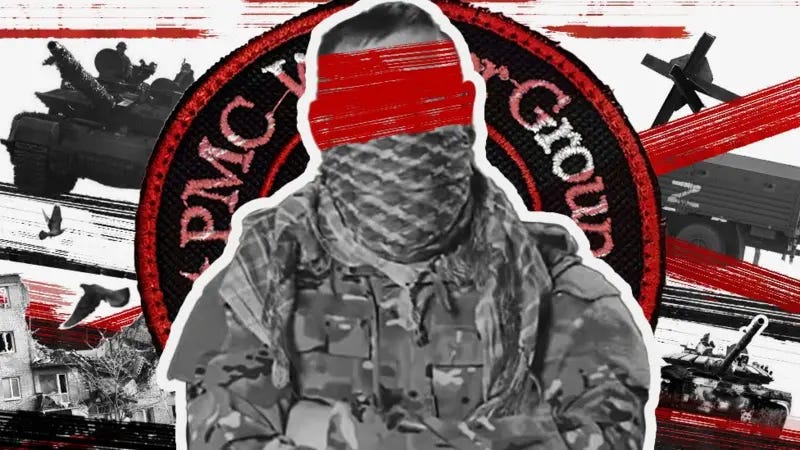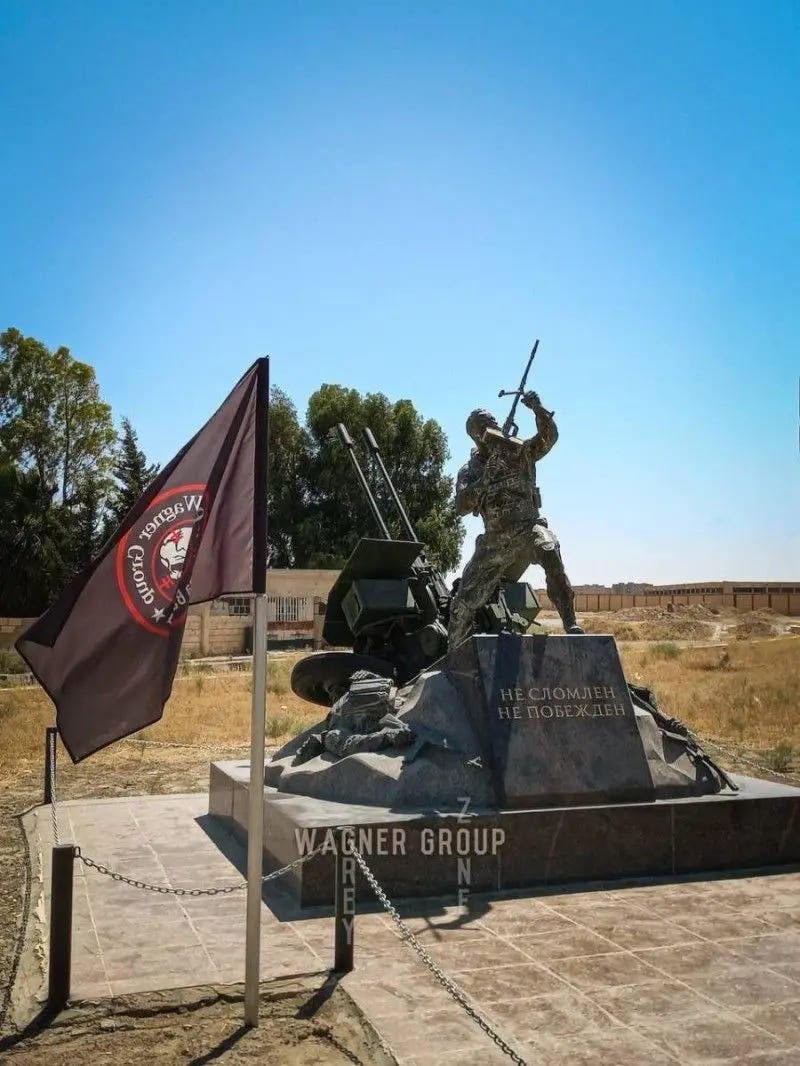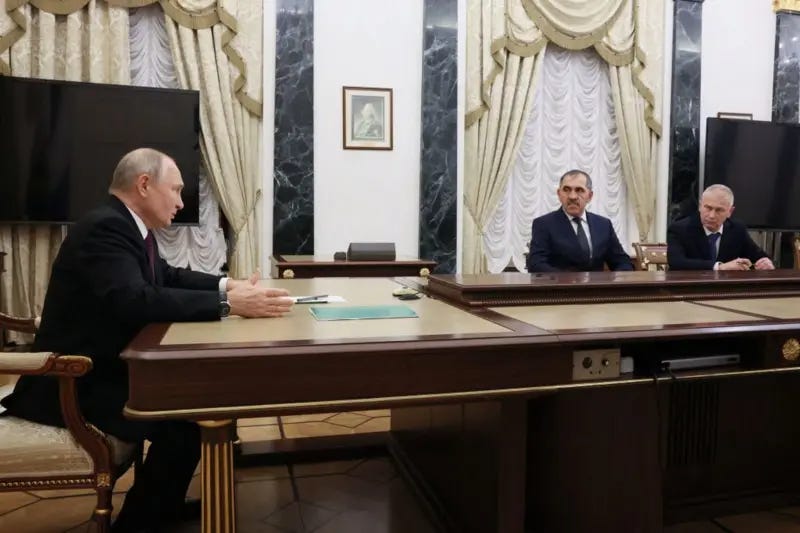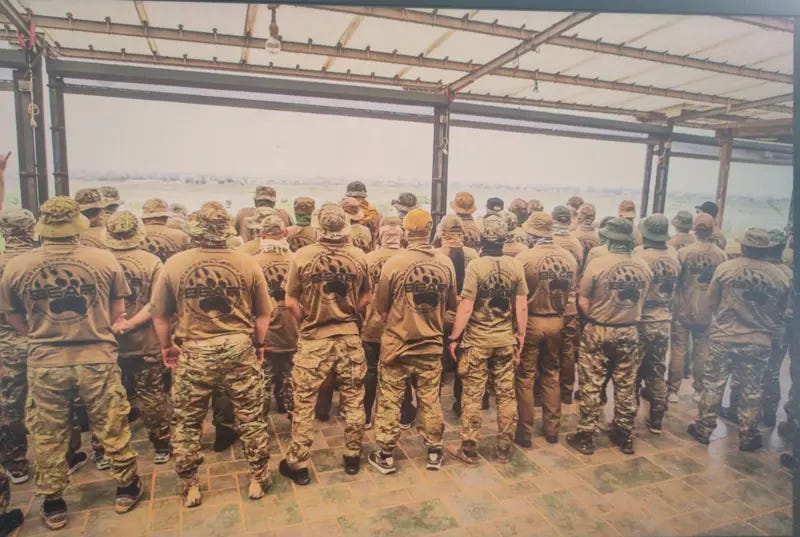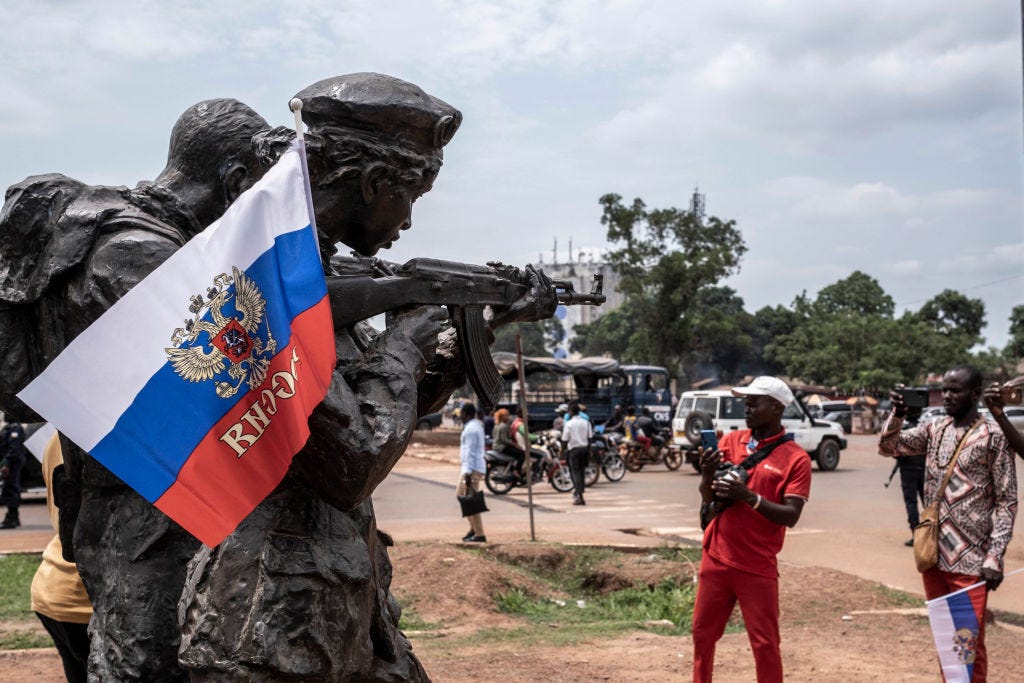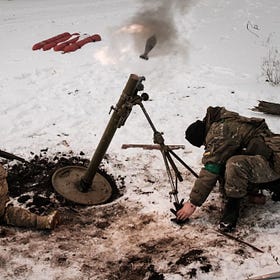Wagner’s Inheritance. What has happened to Yevgeny Prigozhin’s assets?
A year after the failed mercenary uprising, a BBC investigation leads from Syria through Africa to the Russian Ministry of Defence.
By Ilya Barabanov and Anastasia Lotareva.
One year on from the short-lived mutiny by the Wagner group, and the subsequent death of its leader Yevgeny Prigozhin, what has happened to the group’s assets and contracts, and to the fighters it had deployed in Ukraine, Syria, and north and central Africa? BBC Russian has been speaking to ex-Wagner mercenaries and people close to the former private military company, to find out more.
Heirs divided
In September 2023, a burly young man stood at a check-in counter at Istanbul's vast international airport. Direct flights to the Libyan capital Tripoli, operated by Afriqiyah Airways, did not run every day. His flight, already delayed by several hours, was not especially convenient. But to get to another transit hub - Benghazi, Libya’s second largest city, and the main base of Russian mercenaries under the command of a rebel general - would have been more difficult, requiring a stopover in either Cairo or Alexandria.
He was wearing a keffiyeh, the traditional Arab head covering, Carhartt trousers and a hoodie. Tanned and blue-eyed, the man had been travelling quite a lot the previous summer. In May, he had emerged unscathed from the ‘Bakhmut meat grinder’. After Prigozhin and the defence ministry announced the small town’s capture, having reduced it to smouldering ruins, he set off for Luhansk in occupied Donbas.
While he was there, a Telegram chat message called on him to join the ‘March for Justice’ – the name Wagner gave to their armed uprising on 23 June 2023. He took part in the seizure of Rostov-on-Don and the blockade of the security services HQ there. The last time he saw ‘The Big Boss’ was when Prigozhin got into a car, snapped a couple of selfies, and left the city.
This was the point, he says, he understood his career in Wagner had come to an end.
"When the deals [with the Russian defence ministry] started being cut, and there was all that indecisiveness, with some going to Belarus, some elsewhere, I decided that was it for me. And then when they killed The Man [Prigozhin], there was nothing left for me in Russia."
But he had a valid passport, some savings, and combat experience. These allowed him to freely choose his next place of work. He could have even applied for a Schengen visa and entered the European Union—unlike many of his fellow-fighters, he didn’t have a criminal record. Most of the Wagner commanders are not known public figures - they have not been sanctioned by Europe or Washington.
But he had worked for more than five years with Wagner and didn’t want to abandon his career. He flew to Syria, where he had fought in the past. It didn’t work out, and in a few months the man in the keffiyeh left the country and was trying to get to North Africa.
The warlord, entrepreneur, war criminal and now failed insurgent, Yevgeny Prigozhin, had interests and bases throughout certain parts of the world. But when his life ended in a plane crash near Tver, in circumstances that have still not been properly investigated, the question arose: what to do with his assets, both ‘civilian’ and military? They needed to be divided up.
Syria: you either join the Ministry of Defence - or you can f*** off
In September 2023, Russian President Vladimir Putin and Deputy Defence Minister Yunus-Bek Yevkurov held a meeting in the Kremlin. According to the official transcript, a third person was also in attendance. His name was given simply as Andrey Troshev, with no further information provided. A 61-year-old retired colonel of the Ministry of Internal Affairs, Andrey Troshev is better known by his call sign, ‘Sedoi’ – ‘Grey Hair’ in Russian. He was one of Wagner’s most senior commanders, and the group’s executive director.
The meeting was about forming volunteer units. "You fought in such a unit yourself for more than a year, so you should be aware of the issues that need to be addressed in advance to ensure the best and most successful combat operations," Putin said. The grey-haired man nodded.
When asked later about the status of this individual, the president's press secretary replied, "He works at the Ministry of Defence."
Troshev had been fighting for much longer than a year, of course, and not only in private military companies. A retired police colonel, he had participated in the wars in Afghanistan and Chechnya, and served in OMON and SOBR special forces units, as well as Wagner.
He was executive director and chief of staff during the Wagner combat operations in Syria—at least, this is how he is described in the EU sanctions list. But in June, he didn’t support Prigozhin's mutiny. When Putin met Wagner commanders, Troshev had nodded assent to statements by the president that Prigozhin had not agreed with.
The nods were timely, and served him well. ‘Sedoi’ was appointed ‘overseer’ for the Ministry of Defence - prisoner slang, used by a former Wagner fighter we spoke to. He has known Troshev since the 2015 Syria campaign and has a low opinion of his leadership abilities.
"They couldn't have found anyone more suitable; he'll do exactly as he's told.”
Keeping Prigozhin’s men in Syria, even after active combat there was long over, was important for logistics. Even though the country was mentioned as a possible destination for ex-mutineers, all the units there are now fully under the control of the Russian defence ministry.
Mercenaries located in Syria were offered army contracts, according to two sources who spoke to BBC Russian. “It was either Ministry of Defence, or f*** off,” is how the former Wagner commander in the keffiyeh succinctly put it.
He had sat idle for almost two months in Syria and had no desire to sign a defence ministry contract. They didn’t stiff him on his pay, which he received in cash, and nobody objected to him seeking work in Africa. The only difference was that he wouldn’t be transported there on a military aircraft, but would need to find a civilian flight from Turkey.
There is no official information available for how many Wagner fighters decided to sign a contract with the regular army. But the BBC has reviewed election data which showed an unexpected 500-man increase in the size of the Russian military contingent in Syria. This happened at a time when the fighting was over in Syria and the war was raging in Ukraine, making it reasonable to assume that the extra fighters were former Wagner men.
Africa: “The heir is doing just like his father”
Mid-June this year was a busy time for the crew of an Il-76 transport plane operated by Abakan Air. Between 15th and 18th June they completed a total of 11 flights between Bamako, the capital of Mali, and Ouagadougou, the capital of Burkina Faso. There was not much time to rest.
On the 17th, for example, the aircraft landed in Ouagadougou at 09:42 and returned to Bamako at 11:50, touching down at 12:57. At 14:39, it flew back to Ouagadougou and left Burkina Faso for Mali at 05:58 the next morning. It then set off from Bamako for Ouagadougou again at 08:30.
As well as the shuttling between the two African cities, the Il-76 also visited Juba, the capital of South Sudan, flying in from Aktau, Kazakhstan. Before that, it had flown to Aktau from Al-Fujairah in the United Arab Emirates .
A French-speaking open source intelligence researcher and West Africa security specialist, known as Nomade Sahélien, has written about the Il-76’s movements.
"In Burkina Faso, the recruitment of instructors from Russia continues. The ‘Medvedi’ – Bears - brigade, already numbering over 40 people, has set up its headquarters in Ouagadougou and offers mercenaries three-month missions, with monthly salaries ranging from $2,500 to $4,000.”
"Although the 'Bears' consider themselves a special operations brigade, they are more likely a private military company,” he continues. “They are closely associated with the quasi-private military company 'Redut,' controlled by the GRU - the Main Directorate of the General Staff of the Armed Forces of the Russian Federation.”
And in fact, in August 2023, pro-military pages on the Russian social network VKontakte featured numerous advertisements for recruitment to the volunteer 81st Special Operations Brigade – the very same ‘Bears’.
"We need pilots, technicians, AN-2 [biplanes], MI-8 [helicopters], and MI-24 [helicopter gunships] mechanics," reads a typical text from the announcements. "Decent remuneration starting at 220,000 rubles ($2,500) along with benefits. Six-month contract. Age from 22 to 50 years. Come to Crimea, Simferopol. We provide clothing and training. Travel expenses will be reimbursed upon presentation of tickets."
Hopeful applicants were told to contact the HR department, and a person with the call sign ‘Squirrel’. The GetContact database says that the phone number provided belongs to Lyudmila Zorina. She previously worked for a long period in the tourism sector in the Russian resort town of Sochi before heading up the HR department of the ‘Bears’ brigade.
The first recruitment adverts for the brigade began to appear back in November 2023:
"We need fighters with passports, vaccinations, and preferably a knowledge of the English language. We are also recruiting translators for work in the ‘Green Zone’; women are welcome. All candidates must undergo combat coordination training at an army base in Crimea," the recruiters explained.
The ‘Bears’ also showed up in the news from time to time. The Astra outlet reported in November that mercenaries from the brigade used an axe to attack a civilian before shooting shot him dead in an occupied area of Kherson region, in Ukraine. In February, drunken men in t-shirts bearing the inscription ‘Bears’ beat up visitors to the Krepost café in a village in Crimea.
After the invasion of Ukraine, Russian military intelligence built up a whole network of mercenary groups modelled on Wagner and collectively branded ‘Redut’. A media investigation last October identified over 20 different units recruiting under the ‘Redut’ PMC banner, including Cossacks, Donbas volunteers and neo-Nazi groups.
To start with, they were to be deployed in the war in Ukraine. But following the Wagner mutiny, the defence ministry decided to take over the Africa projects run by Prigozhin. Deputy defence minister Yevkurov had personally negotiated with Prigozhin when the latter reached Rostov during the abortive mutiny. Later that year, between September and December, he made several trips to Syria and Africa with GRU general Vladimir Alexeyev. According to the newspaper Vedomosti, the purpose was to "establish a new format of interaction with African countries, where military-political support had to date been provided through private military companies."
Yevkurov worked closely with the leaders of Mali, Niger, and Burkina Faso. The result was an announcement by the three governments to create a military alliance: the ‘Sahel States Alliance.’ The ‘African Corps’ of the Russian Ministry of Defence, also created by Yevkurov, and for which recruitment announcements began to appear at the end of 2023, was formed to support the new military alliance.
It was expected that Wagner mercenaries already in country would just sign new contracts with the defence ministry, and in some cases that is what happened. But during Putin’s re-election in March 2024, Russian mercenaries were photographed queueing at the Russian embassy in the Central African Republic to cast their votes. It appears that the CAR is the only country where Wagner operations persist more or less unchanged.
Shortly after Prigozhin’s death, there was talk of his son Pavel running the rump Wagner PMC. Not under the auspices of the Ministry of Defence, but with the patronage of Viktor Zolotov, the head of the National Guard, Rosgvardia. Pavel Prigozhin, aged 26 according to some sources, 28 according to others, inherited most of his father’s assets, including the military ones.
"Moscow has given the successor a green light to continue his father's work in Africa, on the condition that it does not conflict with Russia's interests," said one BBC source, formerly associated with Yevgeny Prigozhin, about his son’s prospects.
Another source, based in one of the African countries, agrees: "We work as we used to, get paid, nothing has changed," he says.
There is no formally documented decision, but Wagner mercenaries continue to operate in the CAR. The Central African news publication Corbeau News reported in May that men from the PMC had detained a Belgian citizen working for a US-based non-governmental organisation, FHI 360, in Zemio, near the border with the Democratic Republic of Congo. His fate remains unknown, and FHI 360 has not commented.
As well as keeping up a military presence in the CAR, Prigozhin Junior. has attempted to revive the political projects his father pursued in Africa. "The Prigozhin empire has shown signs of life again. They approached us regarding various projects in Africa," says one BBC source.
"Apparently, everything is coordinated with someone in Moscow. They are interested in South Africa, primarily. The focus remains the same: political processes, elections, influencing public opinion through the media. In 2024, general elections have been scheduled in South Africa, Namibia, Mozambique, and Botswana," the source concluded.
The war in Ukraine may be the Kremlin’s main concern, but it would evidently still like to keep a hand in political affairs elsewhere.
“Akhmat”: Everything will be just like in Wagner
"Hello everyone, all is well. Saved my leg and arm, now I’m off to do more of the same." A video with this message to his colleagues was recorded in March 2024 by the former chief of staff of the 13th Assault Brigade of Wagner, Sergey Petrenko, known by the call sign ‘Granit’.
Four months earlier, Petrenko had been one of the first Wagner commanders to join the Chechen ‘Akhmat’ battalion, named after the assassinated father of the republic’s leader, Ramzan Kadyrov. The move followed an open schism between the unit and Wagner just before Prigozhin died: ‘Akhmat’ fighters had been seen to advance on Rostov during the uprising, saying they intended to liberate it from the mercenaries. In the event, they didn’t arrive on time, and their intervention was limited to social media posts.
There was a clear interest in publicising a rapprochement. So in late October, Kadyrov and one of this top generals, Apti Alaudinov, claimed 170 former Wagner fighters had transferred to Chechen units. Sources told the BBC the figure is in reality no more than 50 men, with Petrenko the only prominent individual among them.
In his case, the motivation might be his relationship with the ‘Z-blogger’ Anastasia Kashevarova, who helps out the Chechen leadership with PR duties. But Granit’s combat journey with ‘Akhmat’ was not to be a very long one. The video to his colleagues showed him with a severely battered face, saying his wounds nearly cost him an arm and a leg. Medics saved both in the end.
In early April, General Alaudinov once again drew attention to former mercenaries joining ‘Akhmat.’ This time, the big name was Alexander Kuznetsov, call sign ‘Ratibor’. He recorded a video alongside the Chechen, telling his former comrades: "Everything will be like in Wagner, identical. No paperwork or anything. Our way of doing business stays the same, nothing changes."
‘Ratibor’ had been out of action with wounds received in an artillery attack. Barely back on his feet, he decided to go back into battle as part of ‘Akhmat,’ according to the Chechen leader. Ramzan Kadyrov. claimed up to 3000 former mercenaries from Prigozhin’s fighters were due to join Chechen units alongside Kuznetsov. Whether they did or not is unknown. There have been no updates on ‘Ratibor’ and his comrades since early April.
As of now, up to 100 Wagner mercenaries remain in Belarus, where they are training President Lukashenka's forces, according to ‘Belaruski Gayun,’ an OSINT project monitoring military activity in the country. The report concludes that Wagner is no longer considered a destabilising factor.
Wagner mercenaries have largely faded from public view in respect of their involvement in Russia's invasion of Ukraine. Former members occasionally appear in criminal stories in the news: for example, a former Wagner fighter attacked a child with a knife in Krasnodar Krai, resulting in the 12-year-old being hospitalised with a chest wound. Such reports are gradually being replaced by stories about fighters from other groups like ‘Storm-Z,’ which is now recruiting convicts, just as Prigozhin used to do.
As for the man in the keffiyeh, he reached the African country he had in mind despite more stopovers than he expected. He says he is not bothered about what his former colleagues are doing. Most have been absorbed into the Russian defence ministry and serve in newly-formed units.
For him, he says, mercenary work is a job like any other. Ideology has nothing to do with it. That’s why he chose Africa, judging it a better option than staying in Luhansk or Belarus, where he sees no good prospects.
BBC is blocked in Russia. We’ve attached the story in Russian as a pdf file for readers there.
Read this story in Russian here.
English version edited by Chris Booth.



